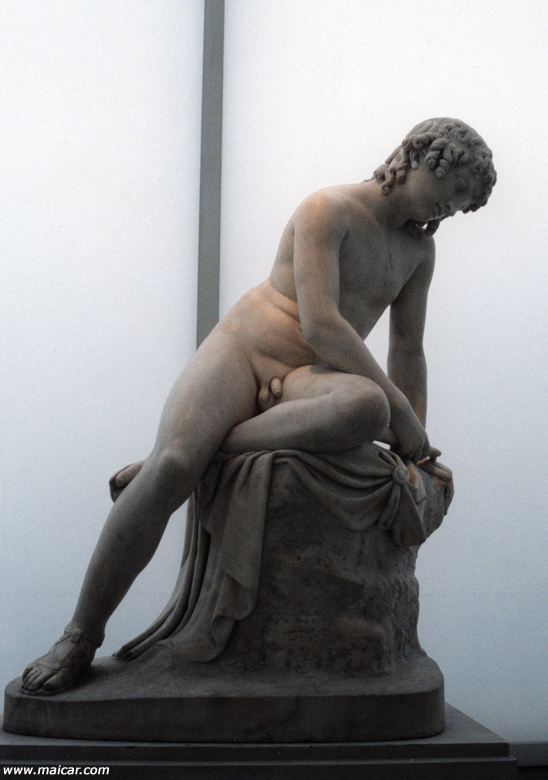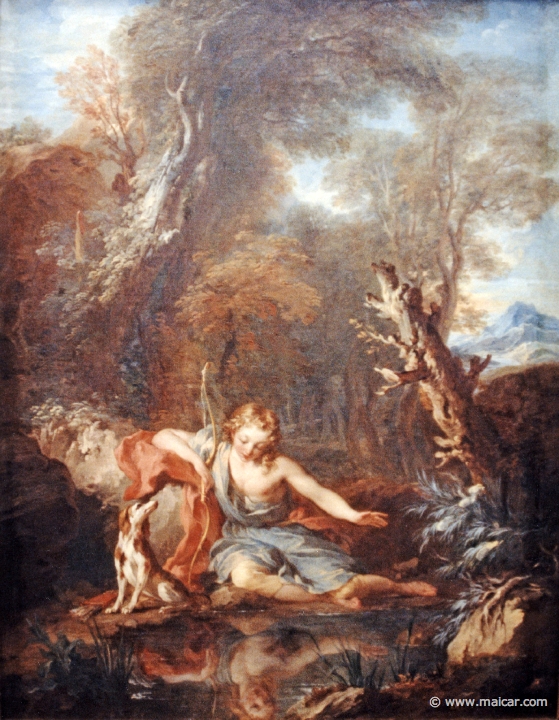|

|
Narcissus in love with his own reflection. 8116: John Gibson 1790-1866: Narcissus 1838. Marble. Royal Academy of Arts, London.
|
|
|
"What you seek is
nowhere; but turn yourself away, and the
object of your love will be no more. That
which you behold is but the shadow of a
reflected form and has no substance of its
own. With you it comes, with you it
gostays, and it will go with you
..." (Ovid, Metamorphoses 3.433).
|
|
Narcissus is remembered for having fallen in
love with his own reflection.
Great beauty
Narcissus, who was loved by Apollo and is counted among the most handsome young men, was the son of the river god Cephisus and the nymph Liriope (Hyg.Fab.271; Ov.Met.3.342), or of Endymion and Selene (Moon) (Nonn.48.581). His beauty has been compared to that of Adonis, whom Aphrodite loved, or to
that of Endymion, whom Selene loved, or to that
of Ganymedes, whom Zeus loved, or to that of Hyacinthus 1, whom Apollo loved, or to that
of Hylas, whom Heracles 1 loved, or
to that of Hermaphroditus, whom Salmacis loved, or to that of Chrysippus 2, whom Laius 1 loved. It is
also said that his looks were worthy of Dionysus 2 or Apollo.
Tiresias' prophecy
When Narcissus was born, Tiresias was asked
whether the child would live a long life, and the
seer, aware of the difficulties of the enigmatic
maxim "Know thyself",
replied:
"If he never
knows himself." (Tiresias. Ovid, Metamorphoses 3.350).
Loved by many
When Narcissus was a sixteen years old
deer-hunter, the nymph Echo (another reflection) fell in love with him. But her
love was not returned, and she disappeared from
woods and mountains, fading away. It is told that
not even her bones remained, having been turned
into stone, but that her voice—made utterly
brief by the anger of Hera—still lives in her. Besides Echo, many other NYMPHS and youths sought
Narcissus' love, but were ignored by him. Finally
one of them prayed to heaven:
"So may he
himself love, and not gain the thing he loves!" (Ovid, Metamorphoses 3.405).
Impossible love
That prayer was heard by Nemesis. And so
Narcissus, having come to a pool to quench his
thirst, saw his reflection in its smooth surface,
and fell in love with it. And since he could not
obtain the object of his love, he died of sorrow by
the same pool. The NYMPHS grieved him, including Echo. But when they prepared his funeral pyre, they could not find his body. Instead they found the flower that today bears his name. It is told that Narcissus still keeps gazing on
his image in the waters of the river Styx, in the Underworld.
|

|
3210: Narcissus in love with his image, 1728. Painting by François Lemoyne, 1688-1728. Hamburger Kunsthalle.
|
|
The story and the flower
The spring where Narcissus saw himself is said to be in the territory of the Thespians, in a place called Donacon. Some reject the story of Narcissus looking into the water, failing to understand that he saw his own reflection, falling in love with himself, and dying of love at the spring. They find it stupid to imagine that a man old enough to fall in love was unable to distinguish a man from a man's reflection. Instead they assert that Narcissus had a twin sister, and that both were exactly alike in appearance. He (they explain) fell in love with his sister, and when she died he used to visit the spring, knowing well that he saw his reflection, but finding some relief for his love because it reminded him of his sister (Pau.9.31.7-9). It is also believed (Pau.9.31.9) that the flower already existed before Narcissus, at the time when Hades abducted Persephone. For it
was while she gathered flowers over a meadow,
attracted by the sweet scent of the narcissus
("and not violets"),
that the earth opened and Hades sprang out upon her
with his immortal horses, taking her with him to be
the queen of the Underworld. Others (Hom.Dem.9) affirm, however, that the "snare for the bloom-like
girl" consisted of roses, crocuses, irises,
hyacinths, the narcissus, and violets as well.
| Family |
|
|
| |
|
|
|
|
|
|
|
Cephisus is one of the RIVER GODS. Liriope is
one of the NYMPHS. She
was ravished by the river god, "while imprisoned in his
waters" (Ov.Met.3.343).
Endymion is the man
who chose to sleep for ever. Selene is Moon. They begat Narcissus in Latmos (the mountain in Asia Minor, near Miletus) (Nonn.48.582).
|
|
|
|
|
|